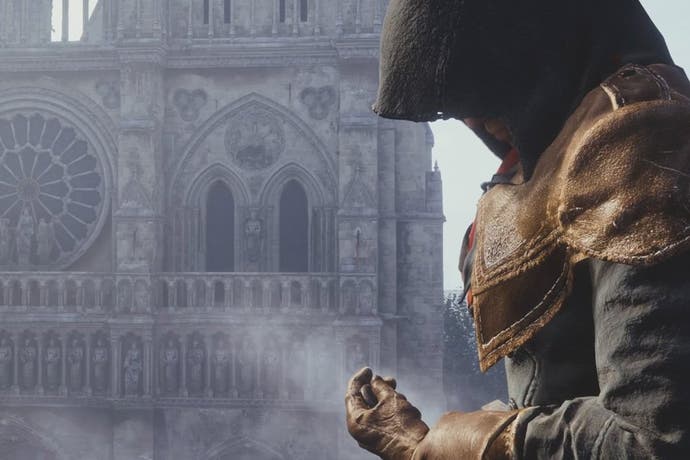Assassin's Creed Unity is a backward step for progressive games
'They're not avatars' defence sends the wrong message.
So, new comments from Assassin's Creed Unity's creative director Alex Amancio at E3 help us to disentangle the situation around Ubisoft Montreal's removal of female avatars from the game, although whether it's a satisfactory response is another matter.
You can judge for yourself, but as far as I can see he's essentially saying that he misspoke; that Unity was never intended to have customisable avatars in co-op and that instead it's closer in principle to Watch Dogs. In that game, everyone playing appears to themselves, in their own world, as Aiden Pearce, but they will perceive any human invaders as random hackers, and should they invade another world then they will appear to the host player as a random hacker. Amancio is saying that it is the same in Unity: that you always appear to yourself as Arno, but your appearance in another player's game is different.
That being the case, though, it raises the question of why Amancio's team ever had female character models on the to-do list in the first place. And the answer is surely obvious: if you're going to display other random assassins to players in a co-op game, then it makes sense to present a mixture of men and women, because, you know, half of the population of the world are women. "I understand the issue, I understand the cause, and it is a noble one, but I don't think it's relevant in the case of Unity," said Amancio. But you're also saying that you did think it was relevant at one point. Why the change? It feels like a convenient excuse.

So that's the micro side of the issue: they've made a dumb decision at some point in development and now they're trying to explain it away rather than doing the astonishingly obvious thing they should do instead, which is fix it.
Pulling back a bit, though, this story is merely a symptom of a wider problem in video games to which we - and I include myself in this - generally turn a blind eye: video games are still terrible at this stuff and it is preventing them becoming all that they can be. We have more strong female characters in games than ever, but it's still a piddling minority and there are usually caveats. There's Ellie in The Last of Us (playable some of the time or in the DLC), FemShep (only acknowledged by the packaging in the third instalment when the franchise was already established) and there's, well, Lara Croft (only allowed to be a more rounded human being now that she's built an empire). And for every one of them, there are - probably literally - one hundred men in vests or space armour going through ultraviolent neck-stabbing journeys of tender self-discovery.
So what do we do about it? I was talking to a friend yesterday and he made an interesting suggestion. He pointed out that huge companies like Ubisoft all have policies governing employee behaviour. So as a starting point, why not include a clause that governs gender representation in games? It's not a difficult thing to pin down: if you are making a game where you can select an avatar, you have to be able to choose women as well as men.
Attentive readers will observe that this wouldn't resolve the Assassin's Creed Unity situation. If Ubisoft Montreal's argument is that you always appear as Arno and there are no avatars in the game, that wouldn't be covered by this. But correcting the kind of inequality that we see in games at present isn't about going after specific instances. It's about targeting fundamental attitudes and behaviour - and you do that by setting an example. And the interesting thing about seeding attitudes and behaviour like this is that it rubs off into other areas. If game publishers made it policy to offer this choice whenever you include avatars in a game, it would be front-of-mind for their developers. It would influence their work directly and their thinking indirectly.
To use the Assassin's Creed Unity example, you can imagine someone standing up to the director and saying, "I know these co-op partners aren't technically avatars, but women should still be represented because it's important to represent women in our games." And perhaps the creative director would be able to empathise with that and realise that it wasn't just a nice extra to have, but a fundamentally important part of making a game.
Changing fundamental attitudes and behaviour. This is also why Amancio is horribly wrong about the relevance of this issue to Assassin's Creed Unity, because up to now Assassin's Creed has been setting a decent, if not spectacular example. It has plenty of strong female characters. It always let you play as women in multiplayer (cutting multiplayer from Unity certainly has not helped this situation). And there is even an Assassin's Creed game starring a woman. Presenting us with a game in which you cannot choose to be represented by women, and when the game chooses to represent your presence it will not even randomly decide that you might, you know, on the balance of probability, occasionally be a player who might be a woman, is a step backwards. It is part of the message your work sends. I cannot imagine anything that is more relevant.
It would be very nice if, in the time remaining to Amancio and his team, someone reached the same conclusion and did something about it.
Curious about Unity's co-op mode? Our guide to what you can expect from the game has everything you need to know.

